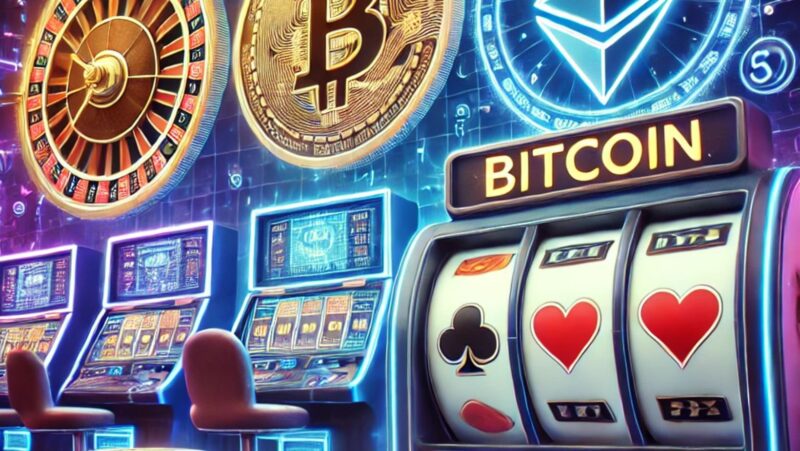
The digital age has forever changed the gambling industry, giving rise to online casinos. These platforms offer unprecedented convenience and a variety of gaming options accessible from anywhere with an internet connection. However, the shift to online gambling brings significant security challenges.
Online casino security is crucial to protecting both players and operators from cyber threats such as data breaches and fraud. Traditional security measures are often insufficient to combat these risks. This is where blockchain technology steps in as a robust solution. By leveraging cryptographic protection and decentralized networks, blockchain can enhance security, ensure transparency, and foster trust within the online gambling ecosystem.
The Need for Security in Online Casinos
Online casinos face increasing threats, such as cyberattacks and data breaches. These attacks can compromise sensitive information, including player data and financial transactions, leading to severe consequences.
Key security issues include:
- Cyberattacks: Hackers target online casinos to steal data, manipulate outcomes, or disrupt operations.
- Data Breaches: Unauthorized access to player information can result in identity theft and financial loss.
The impact of these security issues extends beyond immediate financial damage.
Player Trust
- Players expect a secure environment where their personal and financial data is protected.
- Breaches can deter players from trusting the platform, leading to a loss of customer base.
Business Operations
- Cybersecurity incidents can lead to substantial financial costs for remediation and legal consequences.
- Reputational damage can affect long-term business viability.
Ensuring robust security measures is essential for maintaining player trust and operational stability in the competitive online gambling industry.
How Blockchain Technology Enhances Online Casino Security
Cryptographic Protection and Fraud Mitigation through Blockchain Technology
Blockchain technology offers significant advancements in securing online casinos, primarily through its use of cryptographic techniques. At its core, blockchain is a decentralized framework that ensures data integrity and transaction security.
Cryptographic Techniques in Blockchain
Online casinos can leverage blockchain’s cryptographic methods to safeguard player data and transactions. Key cryptographic techniques include:
- Digital Signatures: Each transaction on the blockchain is signed with a digital signature, ensuring that only authorized parties can initiate transactions.
- Hash Functions: These functions generate a unique code for each transaction, making it nearly impossible to alter without detection.
- Public and Private Keys: These keys encrypt and decrypt information, providing an additional layer of security.
These techniques collectively ensure high levels of transaction integrity, protecting against unauthorized access and tampering.
Real-world Implications for Fraud Prevention
In practical terms, the use of blockchain technology in online casinos translates to robust fraud prevention mechanisms:
- Verifiable Transactions: Every transaction is recorded on an immutable ledger, making it easy to verify and audit. This transparency significantly reduces the risk of fraudulent activities.
- Tamper-proof Data: Once data is added to the blockchain, it cannot be altered or deleted. This immutability ensures that player information remains secure.
- Reduced Risk of Double Spending: Blockchain’s consensus mechanisms prevent double-spending, ensuring that each token or cryptocurrency is only spent once.
The adoption of these technologies has real-world benefits. For example, secure online casinos utilizing blockchain can offer players peace of mind by guaranteeing that their personal information and funds are protected from cyber threats.
Transparent and Fair Gaming Experiences with Blockchain: A Game Changer for Players?
Transparency in gaming outcomes is crucial for building player trust. Blockchain technology can revolutionize this aspect by providing verifiable game results:
- Provably Fair Algorithms: These algorithms allow players to independently verify the fairness of each game outcome.
- Smart Contracts: Automated contracts can ensure that game rules are enforced consistently without human intervention.
This level of transparency ensures fair play, which is essential for maintaining a trustworthy online casino environment.
Resilience Through Decentralization: Why It Matters for Online Casinos’ Operational Stability?
Decentralization removes the single point of failure often seen in centralized systems. Benefits include:
- Enhanced Security: Distributed networks are less vulnerable to attacks compared to centralized servers.
- Operational Continuity: In case one node fails, others can continue operations without disruption.
These features contribute to a more resilient and reliable online casino platform.
Challenges to Blockchain Adoption in Online Gambling: What Lies Ahead?
Despite its advantages, blockchain adoption faces several challenges:
- Scalability Issues: Current blockchain networks struggle with high transaction volumes, which may impede widespread adoption.
- Regulatory Hurdles: Different jurisdictions have varying regulations regarding blockchain implementation.
Addressing these challenges is crucial for the future growth and security of online casinos using blockchain technology.
Transparent and Fair Gaming Experiences with Blockchain: A Game Changer for Players?
Transparency in online gambling is crucial for building player trust. Blockchain technology ensures transparency by utilizing a decentralized framework that records all transactions on an immutable ledger. This means every bet, payout, and game outcome is publicly verifiable, eliminating concerns about hidden manipulation.
Mechanisms for Verifying Game Outcomes:
- Provably Fair Gaming: Blockchain enables provably fair mechanisms, allowing players to verify the fairness of each game round. Using cryptographic techniques like digital signatures and random number generation, both players and operators can ensure that outcomes are generated fairly.
- Transaction Integrity: Every transaction on the blockchain is secured through cryptographic methods, ensuring transaction integrity and preventing tampering or fraud. Each transaction is signed using digital signatures, making it impossible to alter without detection.
Decentralization vs. Centralized Systems:
- Centralized Systems: Traditional online casinos use centralized servers to manage games and transactions. This centralization creates a single point of failure, making these systems vulnerable to hacks and fraud.
- Decentralized Framework: In contrast, a decentralized system distributes data across multiple nodes. This enhances security by removing the single point of failure, making it more resilient against attacks.
The role of cryptographic techniques in securing transactions on the blockchain cannot be overstated. These techniques ensure every transaction is verifiable and immune to tampering, contributing significantly to online casino security.
By leveraging blockchain technology, online casinos can offer players transparent and fair gaming experiences, fostering trust and enhancing security in the digital age.
Resilience Through Decentralization: Why It Matters for Online Casinos’ Operational Stability?
Centralized online casino systems have several risks, mainly because they have single points of failure. If a central server or system has a problem, it can cause service interruptions, data loss, and potentially major failures. Cyberattacks targeting these centralized systems can also take advantage of weaknesses, resulting in significant security breaches.
Decentralization helps reduce these risks by spreading data and operations across multiple nodes. This distribution makes it less likely for uninterrupted service to be affected by a single point of failure. If one node fails or is attacked, other nodes can keep working, making sure that the online casino stays functional and secure.
Benefits of Decentralization:
- Increased Redundancy: With multiple nodes, if one fails, others can step in.
- Enhanced Security: Decentralized networks are more difficult to attack because there is no central target.
- Improved Data Integrity: Distributed ledger technology guarantees that all transactions and data remain unaltered.
By adopting decentralization, online casinos can improve their operational stability and offer a more dependable gaming experience for players. This strategy not only protects the platform but also earns the trust of users who expect uninterrupted access and strong security measures.
Challenges to Blockchain Adoption in Online Gambling: What Lies Ahead?
Scalability Issues
Blockchain technology faces significant challenges related to scalability. Current blockchain networks often struggle to handle large volumes of transactions efficiently. In the context of online casinos, this limitation can lead to slower transaction processing times, which may affect user experience and trust. For instance, popular blockchain networks like Ethereum can only process around 15 transactions per second (TPS), far below the requirements for a high-traffic online casino platform.
Regulatory Uncertainties
Another major hurdle is the regulatory landscape. The legal status of blockchain and cryptocurrencies varies widely across different jurisdictions. Online casinos must navigate complex regulatory frameworks that may impose restrictions or require specific licenses for blockchain-based operations. This regulatory uncertainty creates a challenging environment for widespread adoption, as businesses must continuously adapt to evolving laws and regulations.
Online Casino Security Concerns
While blockchain offers robust security features, integrating it into existing online casino infrastructures presents its own set of challenges. Traditional online casinos have established security protocols that may not easily align with blockchain’s decentralized nature. Additionally, there are concerns about smart contract vulnerabilities and potential exploitation by malicious actors, which could undermine the perceived security benefits of blockchain technology.
These challenges highlight the complexities involved in adopting blockchain for online gambling, necessitating careful consideration and strategic planning by industry stakeholders.
GemBet: A Case Study of a Secure Online Casino Model with Blockchain Technology
Overview of GemBet
GemBet is a trusted online casino platform operating in Southeast Asia, particularly in Singapore, Malaysia, and Indonesia. Known for its reliability and security, the platform offers a wide range of gambling options such as slot games, live casino experiences, and sports betting.
Payment Methods and Security Measures
GemBet offers various payment methods to accommodate its international players:
- Credit/Debit Cards
- E-Wallets
- Cryptocurrencies
Security is crucial for GemBet. The platform utilizes advanced blockchain technology to ensure data protection and transaction security. Key measures include:
- End-to-end encryption
- Two-factor authentication (2FA)
- Real-time fraud detection systems
“Blockchain technology enhances the transparency and fairness of gaming outcomes,” says GemBet’s spokesperson.
By using blockchain, GemBet guarantees that every transaction is permanent and can be verified, greatly minimizing the chance of fraud and boosting player confidence.
These strong security measures have made GemBet a leader in the online casino market in Southeast Asia.












